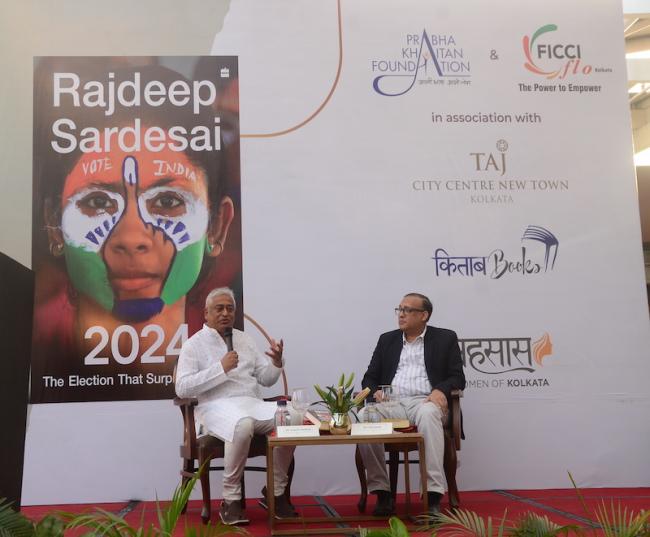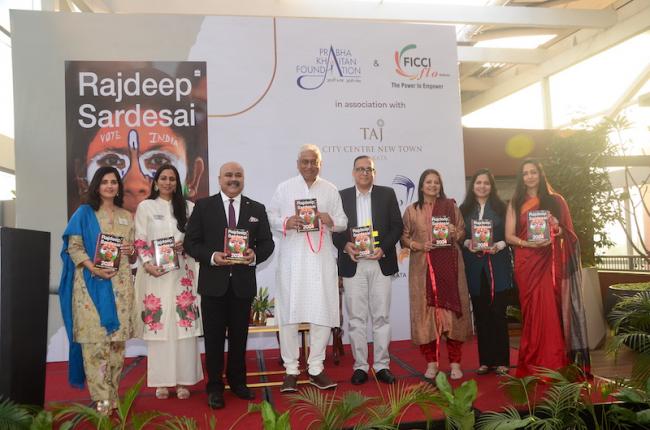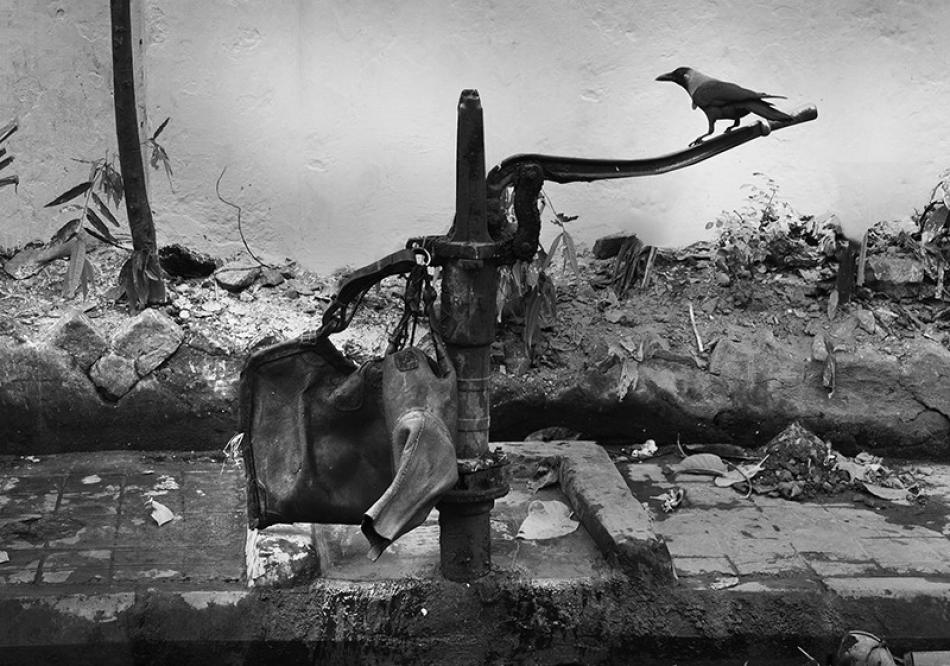NITN | @notintownlive | 12 Jan 2025, 01:59 am
 Books
Books
Rajdeep Sardesai in conversation with Dr. Fuad Halim at Kitaab in Kolkata. Photo courtesy: PKF
Veteran journalist Rajdeep Sardesai unveiled his book 2024: The Election that Surprised India, a document on last year's parliamentary elections that saw a return of the Modi government with a humble majority. In an interaction with medical practitioner, social scientist and political activist Fuad Halim, Rajdeep spoke on the book at length at Kitaab hosted by Prabha Khaitan Foundation FICCI-FLO Kolkata at Taj City Centre New Town Kolkata on a cosy winter evening. IBNS correspondent Souvik Ghosh reports...
Q. You talked about permitting the Kumbh Mela which was allowed in the country during the Covid-19 period leading to the loss of several lives and acceleration of the second wave. How do you reflect on it?
A. What I found out was the medical practitioners and even the government's own Covid committee had opposed the idea of having Kumbh on such a large scale! But the problem was the government claimed victory over Covid in February 2021 and what followed later that year is truly frightening. Not just the Kumbh, we can recall how political leaders - from Narendra Modi to Mamata Banerjee- had campaigned for the Bengal elections. While commoners were expected to maintain social distancing, the government allowed the Kumbh Mela, elections and also a cricket match which was played in Ahmedabad and this despite medical research and advice where it was said that large events must have been avoided. Who is going to be held accountable for it?
I draw the contrast in a way with what happened during the first phase of Covid in 2020. When a Tablighi Jamaat event was held in Delhi suddenly every Muslim almost was having to bear the cost of being called the corona jihadist. But no one in the government was called a Kumbh jihadist! The truth of the matter is an entire festival was held with no social distancing in presence of leaders of Uttarakhand and the Centre, politicians travelling across Bengal in the elections and then we had Covid 2.0! Unfortunately, we really have no systems of accountability at times in this country.
Q. In reference to the farmers' protests, you mentioned Narendra Modi as the Gujarat chief minister had recommended MSP guaranteed by law in 2011. You also added, 'in Indian politics, where you stand depends on where you sit' obviously referring to the shifting political positions as per convenience. How do you see the farmers' protest playing a role in bringing down the tally of the ruling party in 2024?
A. I actually think the farm laws were good. We need agriculture also to be liberated from the State. Why should farmers not get the same benefits that corporate India gets? The opening up of the economy in 1991 was never followed with the liberation of the agricultural sector. So farmers are still very heavily dependent in a way on weather conditions, middlemen and local markets to decide pricing for them. So I support the idea of opening up farming to the market forces. But in a country like India, a government needs to take people along and especially the stakeholders in bringing something game-changing or potentially disruptive. I think that's the fundamental mistake that was made during the farmers' agitation.
Agriculture is a way of life for the Punjabi, Jatsi farmers. A person, whom the urban citizen will see as a middleman, actually is a farmer's lifeline. I have been told by farmers that these people, whom we call middlemen, help them with money during wedding festivities while no corporates will help them. So the sense that lives will be potentially disrupted by these laws needed someone to reach out to them. I think the part of the problem is we have lost the art of dialogue and consensus building across the political spectrum.
At the end of the day, farmers rule the country. Mr. Modi and the government bended by withdrawing the laws because they couldn't have afforded to lose their votes. So it's unfortunate because I think the laws were good. But in Indian politics, a party turns a reformist when in the government but opposes the same being in the opposition bench. The Congress for the longest time brought in reforms during the Manmohan Singh era but they are less inclined to support government reforms as the Opposition.
Q. You must be concerned about the way parties are losing the commitment to ideology and moving from one side to the other as per convenience.
A. Absolutely. One of my home states is Maharashtra. One in every three MLAs in Maharashtra in the last decade has been with more than one party. It is bizarre. It happens in no other place in the world. We have now moved from retail defections to wholesale defections. It's a market out there. It's like an IPL auction, only it's called Indian Political League and not Indian Premier League. In the previous elections, Rs. 50 crore were spent per MLA for switching sides! Some even got the added benefits like suites in five star hotels. The numbers are staggering!
I think voters are also becoming cynical. In the Maharashtra elections, voters have perhaps realised that they should also grab the freebies and accept Rs. 1,500 per month. I think someone somewhere will have to put an end to it. I think there should be a rule barring a leader from becoming a minister for ten years upon switching parties because power is the attraction.
Adding to that, politicians also have a fear of ED. It is bizarre because the Enforcement Directorate in this country only seems to operate in opposition-ruled states. Are we saying no money laundering takes place where the government (BJP) is in power?
Q. As a journalist, how do you see the State assault on the media persons who are actually uncovering truths?
A. Only last week, a young journalist (Mukesh Chandrakar) whom I know well from Bastar was killed. The only reason was he was exposing corruption in road contracts. No one is holding candle light marches unlike how people reacted during RG Kar. Bastar is a long way away. I don't even know whether people of Bastar will have the courage to take on the establishment and fight for this young man who lost his life.
I don't want to exaggerate and say that journalists in India are constantly intimidated and cannot speak the truth. I still believe there are lots of voices who do speak the truth but it is becoming increasingly difficult to do hard, proper investigating journalism. Newsclick editor Prabir Purakayastha was arrested under UAPA for eight months! The same editor was arrested by Indira Gandhi during the Emergency. Some things don't change in this country. One may disagree with his politics but disagreement doesn't make him a criminal. Journalism can't be criminalised.
In Kashmir, they have absolutely no recourse to checks and balances because under the Public Safety Act there, one can be arrested and kept in jail for two years without a trial. I am a recognised face so I have protection. I can deal with sedition charges filed against me. I can get Kapil Sibal to appear for me because I have contacts. But what would young journalists from Kashmir or rural India do? So there is a larger problem here. All those in power are the same whether it's Mamata Banerjee who will arrest someone for a Facebook post or Yogi Adityanath who will nab one for exposing how the mid-day meal scheme was being carried out in Uttar Pradesh.
Q. You spoke about a Manipur BJP MLA who was almost murdered within a few yards of the CM's residence because he belonged to a different ethnic community and he had to come to Delhi. He was a part of the ruling establishment, both at the state and national level!
A. When I think of Manipur, it reflects to me some of the darker aspects of Indian society. The fact is there are still people in Manipur who are living in refugee camps. Kukis cannot go into Imphals while Meitis can't go to Churachandpur. I haven't seen Manipur shake the conscience of Indians in a way RG Kar did. I haven't seen live streaming by the Supreme Court of the plight of Manipuris. It's almost as if Manipuris matter less. The Prime Minister of this country hasn't gone to Manipur once in 18 months. So if the Manipuris have suffered, they deserve a healing touch. Who's going to provide that healing touch?
One of the saddest parts over the years of being a journalist has been to watch any form of communal violence. Nobody - be it Hindu, Muslim, Sikh or Christian - deserves to die because of the religion or ethnicity they belong to. That is simply unacceptable to me. Communal violence - be it covering Mumbai in 1992-93 or Gujarat in 2002 or Muzaffarnagar in 2012 [2013] or Manipur in 2022-23 - has always traumatised me.
What has the State done? More than 3,000 Sikhs died during the 1984 Sikh riot but less than 30 people have been convicted. The Congress was in power. More than 1,000 people died in Mumbai in 1992-93 but about 25 people have been convicted. The Congress was in power. More than 2,000 people died in the Gujarat riots in 2002 but about 30-35 people have been convicted. It's stark. All are having blood stains in their hands.
In Manipur, surely 18 months later greater efforts should have been made to bridge the mistrust and that must start at the top. Our leaders don't want to see the darker side. They want to be seen as the Emperor of the Clones. That's why nobody stood up with the women wrestlers when sexual harassment charges were levelled against an erstwhile BJP MP because that according to them would reveal weakness. But courage sometimes lies in being willing to face the truth.
 Rajdeep Sardesai with Shradha Murarka, Neha Saraf, Indranil Ray, Dr. Fuad Halim, Gouri Basu, Manisha Jain and Esha Dutta at Kitaab event in Kolkata. Photo courtesy: PKF
Rajdeep Sardesai with Shradha Murarka, Neha Saraf, Indranil Ray, Dr. Fuad Halim, Gouri Basu, Manisha Jain and Esha Dutta at Kitaab event in Kolkata. Photo courtesy: PKF
Q. What was the thought behind the book cover which has a girl's face, her inked finger and a tricolour?
A. I had suggested a very generic photo of an audience because this was the year of the voters. I wanted to reflect the power of the Indian voters. I didn't want to use a politician on the cover. The person, whom I had suggested, had sent me a very generic picture of a rally with lots of people. I was in search of one striking face in the crowd. But this is the decade of women. No one can win an Indian election without the women's support. Research shows no political party has won an Indian election in the last 10 years without the majority of the women's support. Male vote may get divided, but women cast their mandates unitedly for a politician or a party whom she thinks is beneficial for them. We noticed this over the Ladki Bahin scheme giving Rs. 1,500 to women per month in Maharashtra in 2024. Whether we agree or disagree, maybe that's the way to move a woman voter.
Late Jayalalithaa, Mamata Banerjee, Nitish Kumar, Narendra Modi himself, Shivraj Chouhan are very successfully reaching out to women voters. It is the reason Mamata Banerjee keeps winning in West Bengal. People say she wins due to Muslim votes, but like her or not Mamata Banerjee has a large chunk of women voters even now in Bengal. To be fair to her, many of her schemes - Kanyashree, Rupashree- are not just driven by elections but she brought them right at the very onset. The Maharashtra government brought Ladki Bahin only four months before the elections. I found it as a straight bribe. But the women voters as well as nationalism matter. This is the age of women voters and politicians are realising it.
The problem is politicians think they can woo the women voters by offering them Rs. 1,000-1,500 monthly which frankly according to me is a wrong way to go about. I support free bus rides. Nothing wrong in giving women free bus rides. The audience may call it freebies but women feel empowered and liberated with free bus rides. It's a way of going to work. It's great if politicians recognise the women and liberate them instead of treating them as vote banks. I don't think monthly financial assistance will liberate women.
Q. How do you see regional parties trying to break out in national politics?
A. The fact is Mamata Banerjee is hugely successful in Bengal but won 0 seats and lost deposits in all constituencies in Goa. India is the most diverse country in the world. The same voter in Bengal who may be attracted to Mamata Banerjee has no time for her or her politics in Goa. Each constituency in Goa has only 25,000-30,000 voters. One can buy an election in Goa. Added to that, Mamata Banerjee is so closely identified with Bengal, she is seen as an outsider the moment she steps outside just the way she has been able to make Modi-Shah look like outsiders in Bengal. This is what makes India unique and diverse. I think that's why regional parties have their limits in India.
A party can be dominant in a region but for it to grow across India is virtually impossible. DMK is a party of Tamil Nadu, it can't expand into even Andhra Pradesh because every state in the south is so distinct from the next. So I think all regional parties have their limits in Indian politics. This also shows the limits of charisma. The same leader who may be charismatic in a particular state but seen as an outsider elsewhere.
Q. Tell us about the thing you mentioned about several candidates across India who won despite the cacophony suggesting it was set to be a Modi sweep in 2024.
A. I am an optimist. Democracy is alive. I profiled 10 people who were quite remarkable. Sanjana Jatav, a 26-year-old Dalit woman and a mother of two in Bharatpur, Rajasthan defeated the chief minister's candidate without any resources. She stood the ground despite threats given to her husband who was a constable with Rajasthan Police. In which other country will a constable be able to encourage his wife to contest the elections and take on the chief minister's candidate? She became an Instagram sensation. And there are such other stories. Rajkumar Roat, a biker, won in Banswara, Rajasthan against a six-time MLA, MP and minister. He and his gang of 20-30-year-olds used to campaign in villages riding a bike wearing t-shirts reading New York. He crowd sourced to get money. This is a fantastic country like no other.
In the US, there is very little for these kinds of candidates at the end of the day. India is still alive. While we may despair over defections, money power, there is something about the spirit of this country which no other country can match. The Indian voter is also strange unlike their counterparts in the US. It's unfathomable how an Indian voter will cross vote.
Q. You have been in close quarters of power in Delhi as a journalist for years. How did journalists' access to people in power change after 2014?
A. The fact is today's politicians including the prime minister don't want to hold press conferences, meet journalists, openly communicate and take tough questions. Those days are gone. He (Narendra Modi) is the prime minister. He is entitled to decide who he wants to meet, how he wants to meet and in the age of social media, it's much easier to put up an Instagram reel or a tweet (X post) or a Facebook post. They don't need to meet people. Fundamentally, political leaders have become rulers. They act like monarchs in a democratic world and not as people's leaders anymore. That's the big change that has taken place.
Q. Most of the pollsters have got it completely wrong when it comes to the 2024 Lok Sabha election results. Why do you think there is such a huge discrepancy in guessing the people's mood?
A. 65 crore Indians vote in elections. It's impossible for someone sitting in a TV studio to know what people want. So everybody often gets it wrong.
(Images shared by Prabha Khaitan Foundation PR Team)
- ‘This Union budget is about building capacity, not chasing short-term consumption’
- AI will replace surgeons, coders — and billions of jobs, warns Sraddhalu Ranade at MCHD-SKC Memorial Lecture
- Religion without servility: Journalist Anshul Chaturvedi on why Vivekananda speaks to believers and atheists alike
- Culturist Sundeep Bhutoria unveils anthology When Gods Don't Matter at Jaipur LitFest 2026
- Kolkata CP urges elderly to stay alert against digital scams at ‘Pronam’ interaction
- Sona Incubations, Salem picks 17 startups for Rs 11 Mn DST investment, grant
- Visva-Bharati University unveils a transformational roadmap under Vice-Chancellor Dr. Probir Kumar Ghosh
- Sona College of Technology hosts Think Salem 2025: To spur startup opportunity from Tier-2 Cities
- ACM India unveils National AI Olympiad 2026 to spot school talent for global AI stage
- Reject Macaulayan education, reclaim Indian values: H M Bangur’s big World Hindu Economic Forum pitch
Gurgaon : Air India, India’s leading global airline, has unveiled a completely refreshed beverage collection, one that brings together some of the world’s most celebrated wines and spirits at 35,000 feet on international routes.
Indian airline major Air India today announced a significant enhancement to its popular Mumbai-Frankfurt route, with the deployment of its newly delivered, first line-fit (or made-for-Air India)
Saudia, the national flag carrier of Saudi Arabia, and Air India, India’s leading global airline, have signed a codeshare agreement that will take effect in February.





